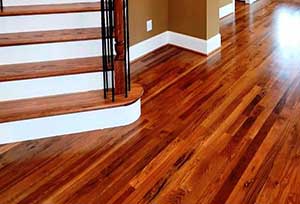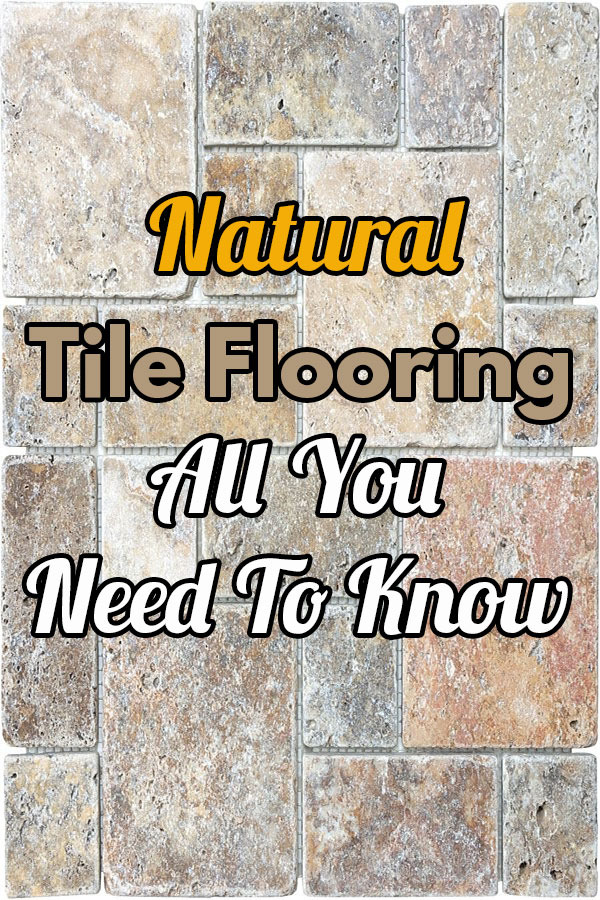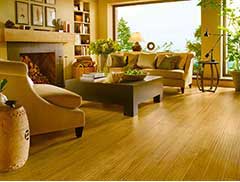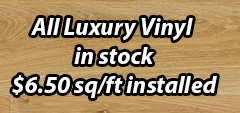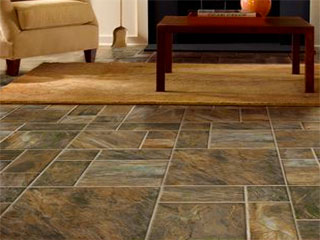 Gemini Floor Services installs all types of flooring materials including tile flooring. Tile happens to be the oldest type of flooring known to man, dating back thousands of years. It has stood the test of time & it can last a lifetime. There’s only a few other flooring materials which can last as long, namely hardwood, polished concrete & terrazzo cement.
Gemini Floor Services installs all types of flooring materials including tile flooring. Tile happens to be the oldest type of flooring known to man, dating back thousands of years. It has stood the test of time & it can last a lifetime. There’s only a few other flooring materials which can last as long, namely hardwood, polished concrete & terrazzo cement.
Tiles are known as extremely environmentally friendly & durable. They’re made from natural clay & stone, are chemical free & hypoallergenic. Tiles come in a vast variety of colors, shapes & textures & can be designed in unique patterns or mosaics. Tiles are extremely versatile & are used for counters, backsplashes, ceilings, walls, walkways, floors, shower stalls & pools. There are several types of natural tile flooring:
Ceramic Tile | Porcelain Tile | Quarry Tile | Terracotta Tile | Stone Tile | Glass Tile
The main advantages of all these types of natural tile are they’re:
Durable & Long Lasting
Clay tiles (includes Ceramic, Porcelain, Quarry Tile & Terracotta), Stone tiles & Glass tiles are all highly durable natural materials. Aside from stone, tile ingredients are all bonded together at extremely high temperatures resulting in a very hard, durable product which can last a lifetime. Tile is fade resistant , fire proof & resistant to stains. Some types of tile like unglazed ceramic and soft stone do periodically require sealer to protect them from stains & scratches. Most types of tile though, like glazed ceramic which is the most common, do not require sealer.
Healthy & Environmentally Friendly
Tiles are made from all natural renewable material, basically just stone, clay & sand. Manufacturing systems use local materials & recycle water & unused portions thus producing very minimal waste. Carbon emissions are low to none as overseas shipping is not required like some other types of flooring materials. There are zero VOC’s (volatile organic compounds, chemical fumes) in natural tile ensuring better air quality where installed. Tile is also hypoallergenic – no worries about mold, mildew, dust mites & other allergens harboring in the floor.
Water Resistant
Most types of tile, which includes glazed ceramic, porcelain, stone & glass tile are used in kitchens, bathrooms & showers as well as outdoors. Porcelain & glass are also used in pools. As mentioned, unglazed ceramic & soft stone does require sealer being less water resistant. With sealer these can also be used in places exposed to moisture.
Low Maintenance
Tile flooring is low to no maintenance, with the exception of those needing periodic sealing. Most tile applications need no more than occasional sweeping & mopping.
Low Lifetime Cost
When compared to all other types of flooring tile was found to have a lifetime total cost of 20%-80% less than all other types of flooring. Initial costs for installed tile can be higher though, especially porcelain & stones like slate & marble which are more expensive materials, harder to cut & require professional installation. However, most ceramic tile, the most common type, is relatively affordable & suitable for DIY installation. And it will add value to your home.
Overall tile has many advantages, there are really just a few features which may be disadvantages: Tiles have a relatively higher initial cost, some require sealing, they can be difficult to remove & tile can become cold to walk on. On the other hand they are ideal for radiant floor heating.
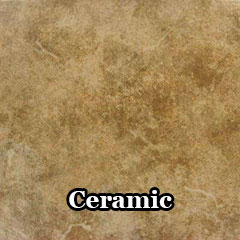 Ceramic vs. Porcelain Tile Flooring
Ceramic vs. Porcelain Tile Flooring
Ceramic tile is a broad term for various types of clay tile which are made by firing clay, sand & minerals together. This includes Porcelain, Quarry tile & Terracotta, which each have a unique production process, composition & qualities.
Porcelain & ceramic are very similar & often difficult to differentiate. The main distinction is that Porcelain contains more feldspar, is made from finer grained clay & is fired at a higher temperature & for a longer time. Thus it is harder, denser & more water resistant. It is more suited where higher water resistance is required like outdoors or in showers or swimming pools.
Still, much of the glazed ceramic tile is suitable for showers. Some ceramic tile is even recommended for outdoors, however porcelain is generally more ideal for outdoor use. This is especially the case in places where there are freezing temperatures. Ceramic tile, being generally less hard & water resistant can absorb water & crack by freezing if the installation isn’t perfectly sealed.
Whether or not a Ceramic or Porcelain tile is suitable for high traffic or areas exposed to moisture all depends on the tile hardness. Tiles are rated from 1-5 with the hardest tile rated 5. Ceramic & Porcelain of reputable manufacturers is given this PEI rating by the Porcelain Enamel Institute.
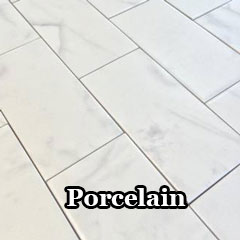 Ceramic vs. Porcelain Coloring & Cost
Ceramic vs. Porcelain Coloring & Cost
Glazed ceramic tiles are colored with a glass like surface glaze after the tile is fired. With unglazed ceramic tiles & porcelain, color pigment is added into the clay before the tile is fired. When glazed Ceramic tile is chipped it is more noticeable because the coloring is on the surface. Porcelain & unglazed ceramic hide chips since the color is throughout the tile (through body). Porcelain & Ceramic tile both come glazed or unglazed. Most ceramic & porcelain tile comes in uniform colors making them easy to replace. Some tiles are design printed with glaze.
Porcelain is a more expensive product. And because it is harder & more difficult to cut, installation is also more costly & must be done professionally. Of all types of tile, ceramic is the most common type used in both commercial areas & residences.
Because Porcelain & ceramic are difficult to differentiate there is a Porcelain Tile Certification Agency (PTCA) which tests products & gives a certification label. To verify that the certification label is authentic you’d have to check the manufacturer & tile with the PTCA list.
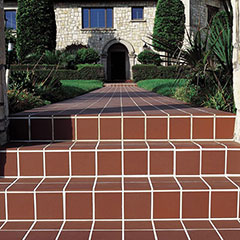 Quarry Tile Flooring
Quarry Tile Flooring
Quarry tile is a relatively inexpensive type of unglazed ceramic tile. They’re made with quarried materials very similar to that of bricks like clay, shale & feldspar. They’re baked longer than bricks & are harder.
Quarry tile is available in shades of red, brown, orange & grey. Red is most common as it is believed to hide stains best. Like porcelain the color is baked into the tile. Color is derived according to the ratio of raw materials – clay, shale or feldspar. More clay gives grayer tones, more shale gives red or brown.
Many Quarry tiles are labeled as vitreous meaning they have low water absorption/ high water resistance. Higher grade quarry tiles are suitable for demanding areas like commercial kitchens & outdoor walkways being water resistant & slip resistant. Such areas exposed to high moisture are advised to be sealed periodically with a penetrating sealer to resist stains. Otherwise sealing isn’t required for normal wear. For outdoor applications in places where freezing can occur a freeze resistant grade quarry tile is required. Otherwise it must be completely sealed with a high quality sealer that will ensure zero water absorption.
Quarry tiles have a rustic appeal with their coarse, unglazed surface & natural earth tones. In households they’re commonly used in kitchens, living rooms, dining rooms, screen rooms & walkways. Quarry tiles look very similar to Terracotta tile but should not be confused.
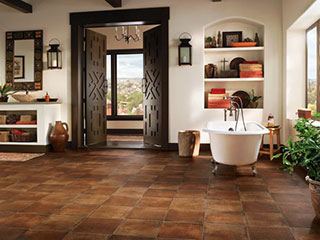 Terracotta Tile Flooring
Terracotta Tile Flooring
Terracotta, meaning “baked earth” (aka Mexican Tile) is a red earthen clay tile. It is one of the oldest types of tile dating back many thousands of years. Still today it is highly utilized especially in Spanish & Mission style architecture. The natural earthen look of Terracotta offers a classic old world charm. As another type of ceramic/clay tile it may be glazed, sealed or used untreated.
Terracotta is less dense & more porous than Quarry Tile. Unglazed Terracotta is less water resistant & thus higher maintenance when used in moisture areas like bathrooms, kitchens & outdoors. If desired it may be used in such areas but will require a routine maintenance of sealing to protect it. If used outdoors where freezing may occur it must be completely sealed with high quality sealer to ensure that there’s absolutely zero water absorption. Glazed Terracotta, Quarry Tile or glazed Ceramic made to resemble Terracotta are lower maintenance options for bathrooms, kitchens & outdoors.
 Natural Stone Tile Flooring
Natural Stone Tile Flooring
Stone tile flooring is another classic choice dating back millenniums. Stone is quarried from the earth’s surface, crust or depths. Today modern machinery like power saws & bulldozers are used to mine, move & cut large boulders & slabs into fine & precise tiles, countertops & other building parts. Amazingly & mysteriously ancient civilizations like the Greeks, Romans & Egyptians were able to accomplish these feats without modern machinery.
Stone tile flooring, generally the most expensive flooring option, is durable, timeless & luxurious. Amongst the several types of stone – marble, granite & limestone are the most popular choices. Stone boasts uniqueness in the color & design of each & every tile. Variety in texture, finish & installation patterns further add to it’s variegatedness.
Stone is more expensive but longer lasting than man made similated stone floor coverings like vinyl & laminate. However, vinyl & laminate require less maintenance than soft types of stone which require sealing. Ceramic & Porcelain tile is also available which resembles stone, even stone like marble with intricate veining. And it can also come with a lower installed price & lower maintenance.
Stone ranges from soft to hard. Soft stone tile is porous, less dense, less water resistant & thus requires regular cleaning & sealing to protect it from stains & scratches. Soft stones like marble, travertine & limestone when left untreated can stain easily. They’re susceptible to harsh cleaners or acidic liquids such as wine, vinegar or orange juice. Hard stone like dark Granite & Slate are dense, nonporous, able to withstand high traffic & resist stains & scrathes without being treated.
Some types of stone have varying grades of hardness. When selecting stone flooring it is important to consider the stone’s hardness, how much traffic there will be, whether it will need to be sealed & how often. Also know that stone installation requires much labor, skill & precision. It’s generally not a DIY type of project.
The most common types of stone tile flooring are Granite, Marble, Limestone, Slate & Travertine.
 Granite Tile Flooring
Granite Tile Flooring
Dark Granite & high grade Slate are the hardest types of stone flooring. Dark Granite is durable & highly resistant to water, stains & scratches. It’s relatively affordable & comes in a variety of colors. It’s especially popular & ideal for kitchen & bathroom floors, shower walls & counter tops. Light colored Granite though is different, it’s a soft stone & requires regular sealing & polishing.
Slate Tile Flooring
High grade slate is mined from deep in the earth. It’s high quality & high labor to acquire makes slate very expensive. It’s a luxurious flooring option that offers lifetime resistance to stains, cracks & slips. It’s low maintenance & slip resistance makes it ideal for both indoors & outdoors. Like Granite it also has a lower grade type which is a soft stone. Lower grade Slate is mined from the earth’s crust, so it’s more easily acquired, less expensive & less durable.
Marble Tile Flooring
Marble, though a softer type of stone is also a luxurious option due to it’s elegant appearance & ability to be highly polished. It boasts an aristocratic heritage that adds opulence to any space. Marble does come in numerous colors & varying grades of hardness. Being a softer type of stone it does require sealing to protect it.
Limestone Tile Flooring
Formed from ocean floor materials like coral & shells, Limestone comes in light shades & is a soft type of stone. As such it may require to be sealed every few years. The appeal of Limestone is it’s luxurious appearance at a lower price. It has become a popular option for affordable natural stone. The color of Limestone tiles are uniform. There are Porcelain tile products that attempt to replicate Limestone. The advantage is that Porcelain doesn’t require sealing.
Travertine Tile Flooring
Another affordable option is Travertine, which is a type of Limestone. Though it is also soft & needs sealing it is popular as it’s affordable & resembles marble. It comes in beige & earth tones. Travertine is used in interiors & exteriors: bathrooms, kitchens, showers, patios & walkways.
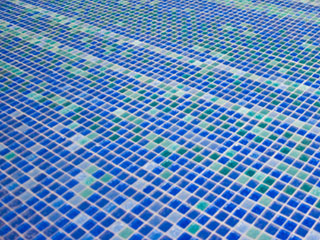 Glass Tile Flooring
Glass Tile Flooring
Glass tile is an elegant & costly option for anywhere. It’s used especially for pools, bathroom & kitchen walls, backsplashes & counters as well as floors. Like an artist’s palette, glass tile comes in an endless array of colors, shapes, sizes & finishes. And it combines well with other types of tile. Glass tile reflects light & brightens a room. The high cost of tile installation includes both the materials & specialized skill required for proper installation. Where cost is not an obstacle, glass has the design potential to create some of the most stunning mosaic floors.
For flooring, glass is better suited for low traffic areas. Particularly because it can be scratched by abrasives, reducing it’s attractive appearance eventually. It also shows dirt easily, though it’s very easy to clean. Glass also can be slippery in wet areas like bathrooms. Though glass is quite crack resistant it still can be broken by a high impact. Broken glass tile can be hazardous & is not easy to replace. Despite the cost & few disadvantages glass is still a popular flooring option because of it’s beauty & creative possibilities.
If you are interested in professional installation of any of these types of tile flooring, contact us at (718) 690-3435.
